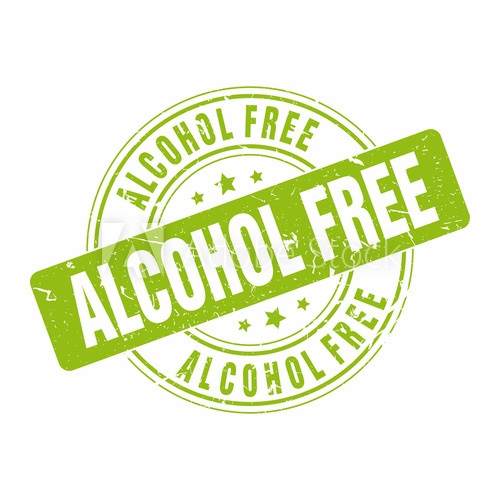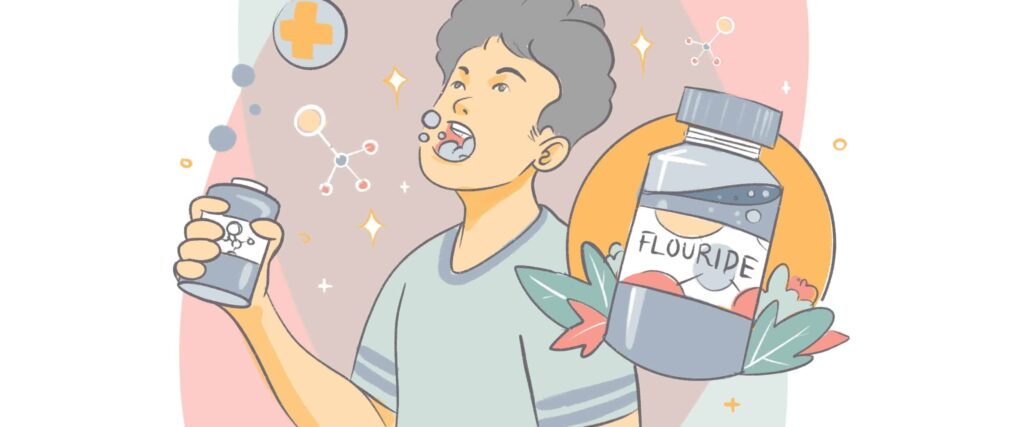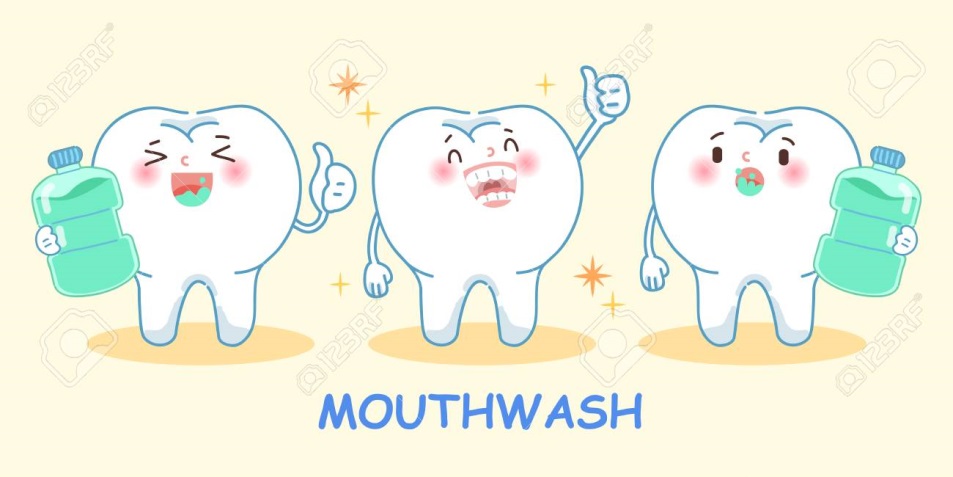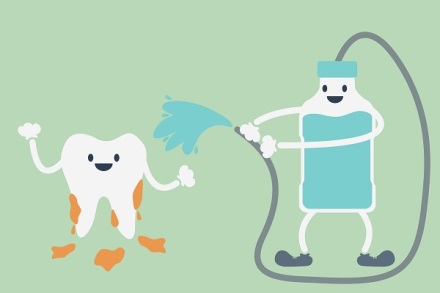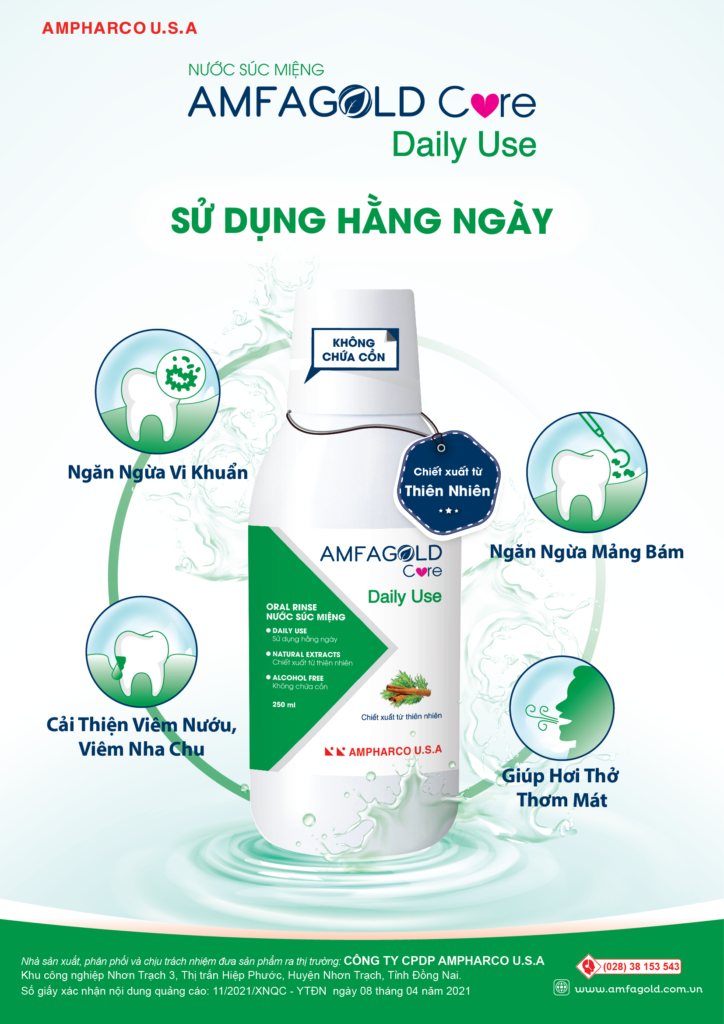CHOOSING MOUTHWASH SEEMS EASY BUT DIFFICULT. WHY?
Besides brushing your teeth, using mouthwash is one of the best oral hygiene measures today. However, on the market today, there are many types of mouthwash, but not everyone knows how to choose and use daily mouthwash safely and effectively.
If you know how to choose and use mouthwash, it will not only help you clean and prevent plaque, but also prevent the growth of bacteria that cause dental problems, help to relieve conditions of gingivitis, pyorrhoea, and bring good breaths. Moreover, using a mouthwash with topical antiseptic ingredients is one of the ways to prevent bacteria and virus, help to prevent respiratory diseases.
What criteria are there to identify the safe and effective mouthwash?
In order to know which mouthwash is good, you need to know the following criteria for choosing a quality mouthwash:
Good mouthwash without alcohol
The first criterion to help you know which mouthwash is good is to choose alcohol-free products. Although alcohol-based mouthwash is bactericidal effect and prevent plaque well, alcohol-containing mouthwash when used in the wrong ways will cause many unwanted side effects such as: unpleasant gums, burning mouth due to irritation. This will cause bacteria to grow quite quickly and cause serious consequences such as gingivitis, bad breath, etc.
In addition, if children or pregnant women swallow alcohol-based mouthwash, it is not safe for health.
Consideration when using mouthwash with fluoride
Fluoride could strengthen tooth enamel, but many toothpastes and drinking water sources have been added this, so the use of fluoride in mouthwash may not be necessary.
Fluoride is a neurotoxin that, in high doses, can be harmful. High level exposure can lead to tooth discoloration and bone problems.
Mouthwash should contain antibacterial ingredient
Bacteria in the oral cavity are considered the leading cause of diseases such as tooth decay, bad breath, gingivitis, pyorrhea … According to the latest studies, brushing teeth can only clean 25% of bacteria in the oral cavity. Therefore, when choosing a good mouthwash for daily use, an important criterion is that the product needs to contain antibacterial active ingredients that contribute to protecting the teeth from harmful bacteria.
Mouthwash contains antibacterial active ingredients that can clean bacteria in the oral cavity thanks to its ability to crept into the interdental spaces, the tongue, the base of the tongue, etc., where the brush cannot clean.
Some antibacterial ingredients have been proven in cleaning and preventing the growth of bacteria in the oral cavity such as: menthol, tea tree oil, aloe vera, clove essential oil (Eugenia caryophyllus leaf oil 80% Eugenol). In particular, research demonstrates the activity of clove oil against gram-positive and gram-negative bacteria that cause human disease, including multi-resistant strains.
Besides brushing your teeth twice a day, using more daily mouthwash is extremely important in protecting your teeth, preventing the growth of bacteria, helping you take better care of your teeth no tooth decay, gingivitis, pyorrhoea or bad breath.
Mouthwash contains ingredients that prevent plaque
One of the causes of gingivitis, periodontitis is due to not having good oral hygiene, so dental plaque will accumulate, creating an opportunity for bacteria in dental plaque to multiply and grow.
One way to help prevent plaque effectively is believed by many people to use a mouthwash with antibacterial ingredients to help prevent dental plaque. Mouthwash makes plaque softer and easier to remove.
Mouthwash with clear origin and origin
To ensure safety, when buying mouthwash, it is necessary to choose products with clear origins and reputable brands. When using products with clear origin, you can be completely assured of the quality for your health because the ingredients inside are controlled, researched, and tested for safety certified by medical organizations, allowing circulation in the market.
If you unfortunately buy products of unknown origin, without controlled ingredients, when used for a long time, it will cause dental diseases, and more dangerously, it will lead to oropharyngeal cancer due to the accumulation of chemicals substances harmful to the body. Therefore, reputable brands will be a top priority.
- Choosing daily use mouthwash extracted from nature such as menthol, tea tree oil, and aloe vera, cinnamon oil, Eugenia caryophyllus leaf oil (80% Eugenol) especially completely alcohol-free the best oral hygiene measures.
The menthol component has significant antibacterial and antiviral effects.
Tea tree oil is highly effective in antibacterial action against mutant streptococci and other oral microorganisms. At the same time, tea tree oil is considered an antibacterial agent that can replace chlorhexidine, an anti-inflammatory agent, can reduce inflammation and promote healing of periodontal tissues, used as adjunctive therapy common periodontitis in patients with chronic periodontitis.
Cinnamon oil helps support oral health: Cinnamon’s antibacterial and antifungal properties have been found to be effective against Streptococcus and on Candida ssp biofilm, two agents which cause oral infections and cavities in teeth.
In addition, the ingredient Aloe Vera has been researched and proven to be an effective mouthwash due to its ability to reduce dental plaque within 4 days of use, as effective as Chlorhexidine compared to placebo.
Eugenol caryophyllus (clove extract) has antibacterial effect, relieves toothache, gum pain and mouth ulcers. For many years now, in dental treatment, the compound eugenol (the main component of cloves) has become a very important medicine. According to research, clove contains about 20 times more eugenol than other herbs.
In particular, the characteristic aroma of clove essential oil also helps you get rid of bad breath very effectively, helping people get closer together.
|
Product information: AMFAGOLD CARE DAILY USE Ingredients: Menthal piperita oil, Tee tree oil, Cinnamon oil, Aloe vera extract, Eugenol, Alcohol free. Manufacturer and Distributor: Ampharco U.S.A Packing size: Hộp 1 chai 250ml Product Notification No: 152/20/CBMP-ĐN Advertising license No.: 11/2021/XNQC-YTĐN
|
Source
“Why do we have fluoride in our water?”, Medically reviewed by Karen Cross, FNP, MSN — Written by Yvette Brazier
https://www.medicalnewstoday.com/articles/154164
“A review of the bioactivity and potential health benefits of peppermint tea (Mentha piperita L.)”, Diane L McKay, Jeffrey B Blumberg
https://pubmed.ncbi.nlm.nih.gov/16767798/
“Antimicrobial activity of garlic, tea tree oil, and chlorhexidine against oral microorganisms”, F C Groppo, J C Ramacciato, R P Simões, F M Flório, A Sartoratto
https://pubmed.ncbi.nlm.nih.gov/12553397/
“Preliminary antiplaque efficacy of aloe vera mouthwash on 4 day plaque re-growth model: randomized control trial”, Rajendra Kumar Gupta, Devanand Gupta, Dara John Bhaskar, Ankit Yadav, Khursheed Obaid, Sumit Mishra.
https://pubmed.ncbi.nlm.nih.gov/24795515/
“Effect of local application of tea tree (Melaleuca alternifolia) oil gel on long pentraxin level used as an adjunctive treatment of chronic periodontitis: A randomized controlled clinical study”, Enas Ahmed Elgendy, Shereen Abdel-Moula Ali, and Doaa Hussien Zineldeen
https://www.ncbi.nlm.nih.gov/pmc/articles/PMC3800405/
“Evaluation of the use of a peppermint mouth rinse for halitosis by girls studying in Tehran high schools”, Roza Haghgoo and Farid Abbasi
https://www.ncbi.nlm.nih.gov/pmc/articles/PMC3894100/
Skidmore-Roth, Linda. Mosby’s Handbook Of Herbs & Natural Supplements. St. Louis, MO: Mosby, 2001. Bản in. Trang 186
Clove.
http://www.drugs.com/npp/clove.html
http://www.webmd.com/vitamins-supplements/ingredientmono-251-clove.aspx?activeingredientid=251&activeingredientname=clove
Cinnamon Oil Benefits and Uses
https://www.healthline.com/health/cinnamon-oil#benefits
https://www.listerine.com/mouth-coach/why-rinse-for-oral-health


